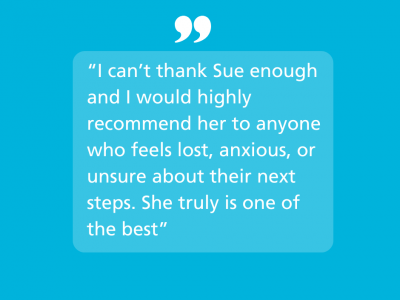- Home
- Anxiety
- Depression
- Emotional Eating
- Living with a long term health condition - Our Talking Health team
- Loneliness
- Menopause
- Mindfulness
- Obsessive compulsive disorder (OCD)
- Panic Attacks
- Phobias
- Pregnancy & Parenthood
- Prolonged Grief (Grieving)
- PTSD
- Sleep Difficulties
- Stress
- Veterans mental health
- Needs We Can and Cannot Meet
- Cognitive Behavioural Therapy (CBT)
- Eye Movement Desensitisation & Reprocessing (EMDR)
- Employment Support
- Counselling for Depression
- Online Self-help
- Mindfulness
- Wellbeing Workshops
- Join the team
- What to expect at your first appointment
- Testimonials
- Talking Health team
- Learn about mental health
- FAQs
- Mental Health Resources
- Blog
- Video Appointments
- Supporting someone through TALKWORKS: A guide for carers and loved ones
- Your feedback
- Making contact if you are deaf
- I need help now
Access support from TALKWORKS
Self-refer to TALKWORKSAccess support from TALKWORKS
Self-refer-
What we can help with
- Anxiety
- Depression
- Emotional Eating
- Living with a long term health condition - Our Talking Health team
- Loneliness
- Menopause
- Mindfulness
- Obsessive compulsive disorder (OCD)
- Panic Attacks
- Phobias
- Pregnancy & Parenthood
- Prolonged Grief (Grieving)
- PTSD
- Sleep Difficulties
- Stress
- Veterans mental health
Access support from TALKWORKS
Self-refer to TALKWORKS - How We Can Help You
- About Us
- Useful Resources
- Get in touch
- Self-refer
How to cope with anxiety around the news and climate change
News consumption has increased hugely in the 21st century. Instead of just reading the newspaper once a day, we are now being flooded with instantaneous information through television, radio, and social media. Given that positive news stories rarely capture as much attention as stories about environmental damage, political climates and global pandemics, many people now find themselves invested in hugely stress-inducing events that they have little control over, yet are unable to look away from. In this blog, we will review in more detail what anxiety around the news can look like and how common it is. We’ll then look at what steps we can take to cope with this anxiety and how a service like TALKWORKS can help with this.
WHAT CAN NEWS ANXIETY LOOK LIKE?
Anxiety around the news can look different for everyone, but you may have noticed:
- Excessive worry about a range of issues
- Discomfort around uncertain or impending upcoming events
- Difficulty sleeping due to uncontrollable worry
- Difficulty concentrating on everyday tasks
- A range of physical sensations: e.g. muscle tension, stomach and chest pain, fatigue
Additionally, this anxiety can then contribute to increased news consumption; in an aim to reduce uncertainty and gain some control over the situation. This may result in you engaging more with these news stories, which in turn may make your anxiety feel inescapable and self-maintaining.
HOW COMMON IS NEWS ANXIETY?
Recent evidence suggests that anywhere between 50-70% of us express a significant degree of worry directly associated with the news. Current studies are suggesting that this could be particularly common in young people, but it can affect people of any age. The worry can feel especially impactful to those with a personal investment in the stories, such as worries surrounding changing laws on immigration.
HOW DO I COPE WITH THIS ANXIETY?
There are a number of different ways that you can learn to manage anxiety. Here are some techniques to consider:
- Worry time: It can help to set aside a specific time of day - around 15-30 uninterrupted minutes - to focus on news stories and the worries that you have around them, perhaps writing them down for reflection. Then, when a worry gets triggered, you can remind yourself that you can return this worry later, then work on refocusing to your present experience. This is a particularly helpful technique for worries that have no immediate solution.
- Gratitude counting: When it feelings like all you’re seeing is bad news, “counting your blessings” can help bring more positive, personal values to the forefront of your mind. It can help to physically write these down in whatever way you feel manageable, such as setting aside time in the evening to write down one or two things you are grateful for, no matter how big or small.
- Mindfulness: This meditation technique aims to change the way you engage with your thoughts. Rather than immersing yourself in distressing thoughts, over time this practice trains you instead to acknowledge the worry, and let it pass. Here at TALKWORKS we run a monthly Introduction to Mindfulness workshop where you can learn more about the benefits of mindfulness and how to add it to your daily routine.
While it is important to keep informed about the world around us, this should not come at the expense of your wellbeing. If you do feel like your anxiety is impacting your life, TALKWORKS can help equip you with effective tools to manage your worries. This can include working 1 to 1 with a therapist for a number of sessions to develop a ‘toolbox’ of techniques to help get you back on track. We also offer a number of wellbeing workshops you may find helpful, see our current wellbeing workshops.
We are all affected by news stories in one way or another, and you shouldn’t have you face that alone. If you would like to access any of TALKWORKS’ services, you can self-refer through our online form or speak to a member of the team by calling 0300 555 3344.
Related Posts

Charlie thanks Sue for the employment support she received
Posted by Admin on 1 December, 2025
.png)
Simone shares her story and thanks TALKWORKS
Posted by Admin on 9 December, 2025

